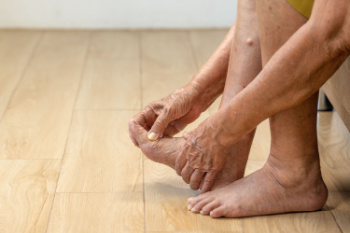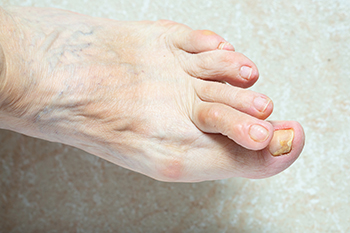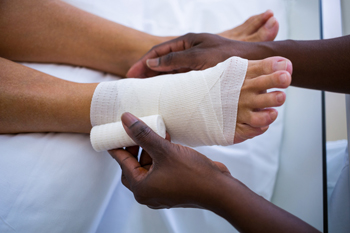Connect With Us
Blog

Rheumatoid arthritis, or RA, can cause significant discomfort and mobility issues in the toes. The inflammation damages the toe joints and surrounding tissues, leading to deformities like hammer toe, claw toe, bunions, and corns, making simple activities like walking painful. Seeking a diagnosis from a podiatrist as early as possible allows for effective management. Treatment typically involves lifestyle adjustments, medication, and sometimes surgery, which a podiatrist can provide. Podiatrists also offer specialized care to alleviate RA symptoms and improve mobility, such as custom orthotics, suitable footwear recommendations, and joint fusion or toe reshaping if necessary. Regular checkups with a podiatrist help to monitor the effects of RA and adjust treatment as needed. By taking proactive steps and seeking professional help from a podiatrist, you can minimize the impact of arthritis on your toes and get the relief you need. If you're experiencing persistent toe pain from rheumatoid arthritis or noticing deformities on the toes, it is suggested that you make an appointment with a podiatrist for personalized care and support.
When dealing with systemic disease of the feet, it is extremely important to check the affected areas routinely so that any additional problems are caught quickly. If you have any concerns about your feet and ankles contact one of our podiatrists from Boca Raton Podiatry . Our doctors will assist you with all of your podiatric needs.
Systemic Diseases of the Feet
Systemic diseases affect the whole body, and symptoms usually are displayed in the feet. This condition can make a patient’s ability to walk unbearable. Systemic diseases include gout, diabetes mellitus, neurological disorders, and arthritis.
Gout – is caused by an excess of uric acid in the body. Common symptoms include pain, inflammation, and redness at the metatarsal/phalangeal joint of the base big toe. Gout can be treated by NSAIDs to relieve pain and inflammation, and other drugs that lower the acid levels in the body.
Diabetes mellitus – is an increase in the level of blood sugar that the body cannot counteract with its own insulin. Failure to produce enough insulin is a factor in Diabetes.
Diabetes of the Feet
Diabetic Neuropathy – may lead to damaged nerves and affect the feet through numbness and loss of sensation.
Peripheral Vascular Disease – can restrict the blood flow to the feet, and often times lead to amputation of the feet.
If you have any questions please feel free to contact our office located in Boca Raton, FL . We offer the newest diagnostic and treatment technologies for all your foot and ankle needs.

Overlapping toes, a condition where one toe rests on top of another, affects people of all ages, from newborns to adults. Causes include heredity, tight-fitting shoes, arthritis, and biomechanical issues. Underlying foot conditions, like bunions, flat feet, hammer toes, or high arches, can also contribute to developing overlapping toes. In newborns, this condition may result from heredity or the positioning of the baby in the womb. Gentle measures such as taping the toes or using toe spacers are effective for newborns, while adults can benefit from conservative methods like wearing properly fitting shoes and maintaining a healthy weight. If conservative treatments fail, surgery may be necessary, especially for severe cases or when a bunion is involved. Early intervention is key to preventing long-term complications. For help in managing problems related to overlapping toes, it is suggested that you schedule an appointment with a podiatrist for an accurate diagnosis and treatment options.
Toe pain can disrupt your daily activities. If you have any concerns, contact one of our podiatrists of Boca Raton Podiatry . Our doctors can provide the care you need to keep you pain-free and on your feet.
What Causes Toe Pain?
Most severe toe pain is caused due to a sports injury, trauma from dropping something heavy on the toe, or bumping into something rigid. Other problems can develop over time for various reasons.
Toe pain can be caused by one or more ailments. The most common include:
- Trauma
- Sports injury
- Wearing shoes that are too tight
- Arthritis
- Gout
- Corns and calluses
- Hammertoe
- Bunions
- Blisters
- Ingrown toenails
- Sprains
- Fractures (broken bones)
- Dislocations
When to See a Podiatrist
- Severe pain
- Persistent pain that lasts more than a week
- Signs of infection
- Continued swelling
- Pain that prevents walking
Diagnosis
In many cases the cause of toe pain is obvious, but in others, a podiatrist may want to use more advanced methods to determine the problem. These can range from simple visual inspections and sensation tests to X-rays and MRI scans. Prior medical history, family medical history, and any recent physical traumatic events will all be taken into consideration for a proper diagnosis.
Treatment
Treatments for toe pain and injuries vary and may include shoe inserts, padding, taping, medicines, injections, and in some cases, surgery. If you believe that you have broken a toe, please see a podiatrist as soon as possible.
If you have any questions please feel free to contact our office located in Boca Raton, FL . We offer the newest diagnostic tools and technology to treat your foot and ankle needs.
 Venous ulcers are open sores that often occur on lower legs and feet, due to poor blood circulation. Symptoms of venous ulcers include pain, swelling, and discolored or hardened skin around the ulcer. Podiatrists, or foot doctors, can help care for venous ulcers by offering treatments aimed at healing the wound, preventing infection, and improving circulation. This may involve cleaning and dressing the ulcer and prescribing compression therapy to reduce swelling and enhance blood flow. There may also be suggested lifestyle changes, such as regular exercise and elevating the legs to improve circulation. If you are struggling with wounds on the lower legs or feet it is suggested that you make an appointment with a podiatrist to get treatment and prevent future ulcers.
Venous ulcers are open sores that often occur on lower legs and feet, due to poor blood circulation. Symptoms of venous ulcers include pain, swelling, and discolored or hardened skin around the ulcer. Podiatrists, or foot doctors, can help care for venous ulcers by offering treatments aimed at healing the wound, preventing infection, and improving circulation. This may involve cleaning and dressing the ulcer and prescribing compression therapy to reduce swelling and enhance blood flow. There may also be suggested lifestyle changes, such as regular exercise and elevating the legs to improve circulation. If you are struggling with wounds on the lower legs or feet it is suggested that you make an appointment with a podiatrist to get treatment and prevent future ulcers.
Wound care is an important part in dealing with diabetes. If you have diabetes and a foot wound or would like more information about wound care for diabetics, consult with one of our podiatrists from Boca Raton Podiatry . Our doctors will assess your condition and provide you with quality foot and ankle treatment.
What Is Wound Care?
Wound care is the practice of taking proper care of a wound. This can range from the smallest to the largest of wounds. While everyone can benefit from proper wound care, it is much more important for diabetics. Diabetics often suffer from poor blood circulation which causes wounds to heal much slower than they would in a non-diabetic.
What Is the Importance of Wound Care?
While it may not seem apparent with small ulcers on the foot, for diabetics, any size ulcer can become infected. Diabetics often also suffer from neuropathy, or nerve loss. This means they might not even feel when they have an ulcer on their foot. If the wound becomes severely infected, amputation may be necessary. Therefore, it is of the upmost importance to properly care for any and all foot wounds.
How to Care for Wounds
The best way to care for foot wounds is to prevent them. For diabetics, this means daily inspections of the feet for any signs of abnormalities or ulcers. It is also recommended to see a podiatrist several times a year for a foot inspection. If you do have an ulcer, run the wound under water to clear dirt from the wound; then apply antibiotic ointment to the wound and cover with a bandage. Bandages should be changed daily and keeping pressure off the wound is smart. It is advised to see a podiatrist, who can keep an eye on it.
If you have any questions, please feel free to contact our office located in Boca Raton, FL . We offer the newest diagnostic and treatment technologies for all your foot care needs.

